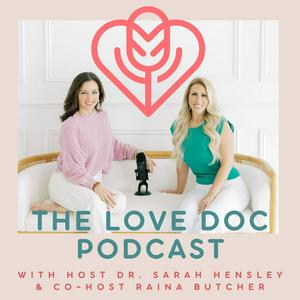Episode 24 | Unoffendable
Hosted by Dr. Sarah Hensley, Specialized Social Psychologist, Attachment Theory Expert, and Founder & CEO of The Dating Decoder with Co-host Raina Butcher, Owner/CEO of Joyful Consulting Welcome to "The Love Doc Podcast" where Host Dr. Sarah Hensley and her co-host Raina Butcher dive deep into the intricacies of love, attraction, attachment, relationships, and self-awareness. Dr. Hensley brings a wealth of knowledge and experience to help listeners navigate the complexities of modern romance. In each episode, Dr. Hensley tackles burning questions about love, relationships, and the mind’s complexities, drawing from her psychological research, real-life experiences, and her own individual expertise, to provide insightful perspectives and practical advice. In Episode 24: “Unoffendable” of The Love Doc Podcast, Dr. Hensley dives deep into a candid exploration of our modern, easily-offended culture and the toll it takes on our nervous systems and resilience. She reflects on how people today are quick to take offense at differing opinions, which often disrupts our emotional balance and has created a deeply divided society. While Dr. Hensley emphasizes that true atrocities—such as murder, sexual abuse, and human trafficking—should rightfully offend us all, she raises concerns about the rise in offense over differences in thought and belief. This, she argues, is eroding respect and open-mindedness in society. Dr. Hensley introduces the importance of emotional resilience versus emotional suppression. She’s clear: she is not advocating for suppressing emotions but promoting emotional resilience. This means developing the capacity to accept others’ views, even when they differ from our own, without offense or alienation. She encourages introspection, urging listeners to question why certain things offend them. Offense, she explains, arises when we feel triggered or violated, highlighting the need for self-understanding as a way to manage these responses. In a thought-provoking segment, Dr. Hensley explains Terror Management Theory, which suggests that when our values or identity feel threatened, it subconsciously evokes fear of mortality, making us feel defensive and offended. Her aim is to help listeners understand that choosing offense can narrow our minds and breed hate, especially in the age of online exchanges where it’s easy to react harshly from behind a screen. Midway through the episode, Dr. Hensley emphasizes that these principles are vital in our closest relationships—particularly with partners, family, and friends. Constant offense, she warns, can rob us of joy and precious time. Instead, she encourages a spirit of curiosity, asking listeners to lean into understanding rather than immediate judgment. By challenging not just others’ thoughts but our own, we can foster genuine connection and potentially gain new insights. As Dr. Hensley wraps up Episode 24: “Unoffendable”, she drives home the importance of looking inward. She advocates for listeners to pause and reflect on why certain things offend them, encouraging them to get curious about others’ points of view rather than reacting. By exploring differing perspectives, she suggests, we can gain valuable insight into our own beliefs and responses. Her hope is that this practice can foster greater empathy and understanding, ultimately helping to bridge divides and bring us closer together in a more united world. This episode serves as both a challenge and a reminder from Dr. Hensley to practice resilience, self-reflection, and compassion in a world quick to divide. Tune in to "The Love Doc Podcast" every Tuesday morning for candid conversations, expert guidance, and a deeper understanding of love and relationships in the modern world. To see all of Dr. Hensley’s services please visit the links below and follow her on social media. Dr. Hensley’s Hybrid Group Coaching: https://www.thedatingdecoder.com/group-coaching/ Book one on one with Dr. Hensley or one of her certified coaches: https://www.thedatingdecoder.com/book-appointment/ Purchase Dr. Hensley’s online course: https://dating-decoder.mykajabi.com/offers/PpEPKnsM/checkout Tik-Tok: the_dating_decoder Instagram: @the_dating_decoder Facebook: The Dating Decoder Youtube: @Dr.SarahHensley What is covered: · The spirit of offense in today's culture. · The toll that being easily offended takes on the nervous system. · The importance of creating grit and curiosity in our children so that can be open minded to others points of view. · What happens when we become offended. . Terror Management Theory. What is it and how does it apply to offensiveness. . The importance of gaining control and clarity around our offensivness within our most imtimate relationships. Consider/Ask Yourself: · Are you becoming too easily offended? · Are you able to recognize when you are offended and how it affects your day to day life? · How can I create more grit and curiosity within myself in order to teach my children the same practices? . How am I allowing offensivness to affect my most important relationships, and in turn how is it affecting my body and mind? . How can I gain more insight around why certain things offend me?

